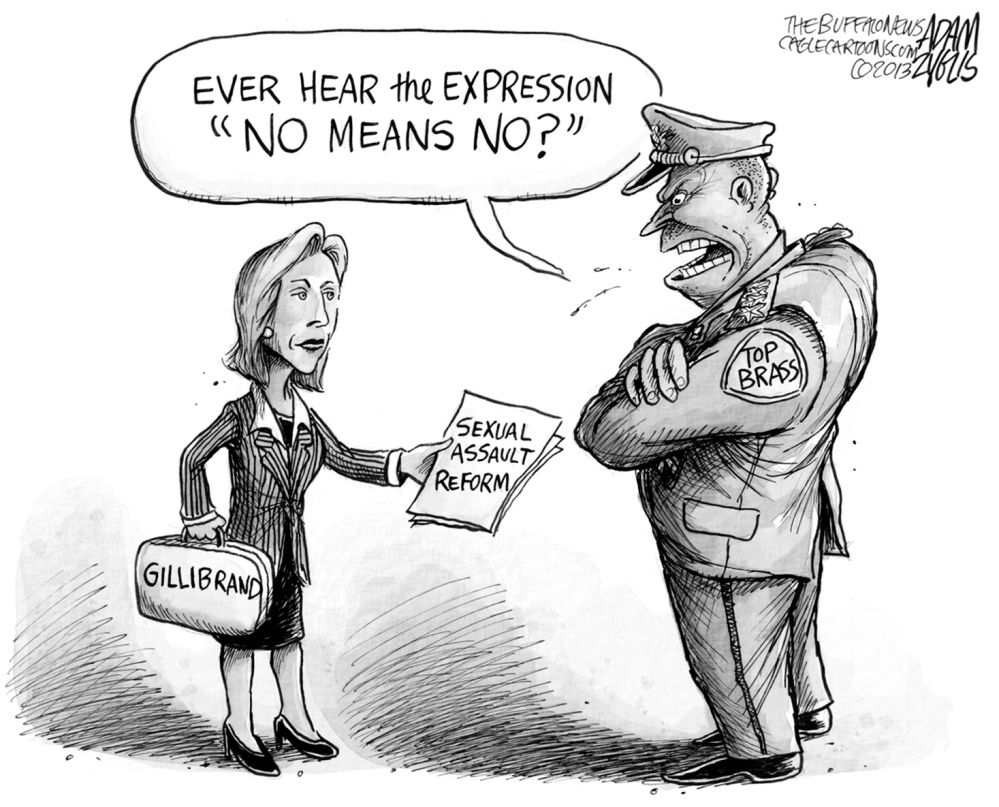The way sexual assaults are handled in the military is a disaster — even the top brass concede this point. The Associated Press provided more evidence of that last week, adding support to the bipartisan push in the Senate to take decisions about prosecuting serious crimes, including rape, outside the chain of command.
The military says it is making progress, but it is far too slow. It is long past time for serious reforms.
The AP obtained documents on hundreds of cases in Japan, the largest overseas U.S. military installation, from 2005 to 2013. The results were appalling: Only a third of convicted service members served time for their crimes, part of a system, as the AP put it, of “random and inconsistent punishment.” Over that period, victims increasingly refused to cooperate with investigators or recanted their stories, widely viewed as a sign they lacked confidence they would be treated fairly.
Sen. Kirsten Gillibrand, D-N.Y., has attracted a bipartisan group of 53 supporters — including Sens. Rand Paul and Barbara Boxer — for her bill to give decision-making authority in these cases to experienced military prosecutors instead of officers in the chain of command. In a more reasonable world, that would be enough, but she faces a threshold of 60 votes in the Senate because of the way filibuster rules are being abused. The bill, the Military Justice Improvement Act, may come up for a vote this week.
Top military leaders oppose it, claiming it would undermine the authority of commanding officers. But the existing system is obviously a failure; experts believe there may be about 19,000 sexual assaults in the military every year, Gillibrand said recently, but only about 3,000 are reported — and there are multiple examples of those cases being handled terribly. That is what’s undermining the authority of the military chain of command.
The existing system gives officers an impossible task. A rape conviction for someone under their command reflects poorly on their leadership. And how are they supposed to judge fairly if a top-performing soldier or Marine is accused, perhaps by someone who isn’t as stellar?
The reforms Gillibrand is seeking will increase the confidence of victims that their cases will be handled fairly, which should increase reporting. They also should increase the number of convictions and the seriousness of the punishment, which will surely be a deterrent that brings down the number of sexual assaults — the ultimate goal.
Military brass and some senators say they’re making progress and that their incremental reforms should be allowed time to work. But they’ve been saying that for decades — remember Tailhook? It’s time for Congress to step in and require major changes in how the military handles sexual assault.
Editorial by the San Jose Mercury News
Send questions/comments to the editors.



Success. Please wait for the page to reload. If the page does not reload within 5 seconds, please refresh the page.
Enter your email and password to access comments.
Hi, to comment on stories you must . This profile is in addition to your subscription and website login.
Already have a commenting profile? .
Invalid username/password.
Please check your email to confirm and complete your registration.
Only subscribers are eligible to post comments. Please subscribe or login first for digital access. Here’s why.
Use the form below to reset your password. When you've submitted your account email, we will send an email with a reset code.